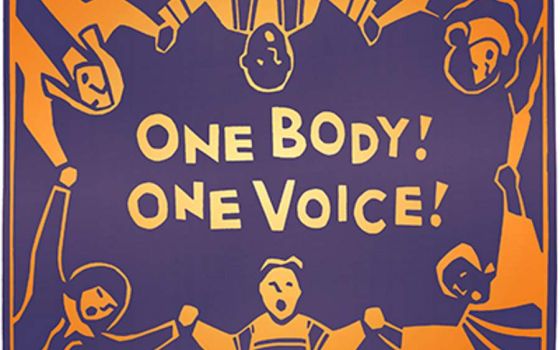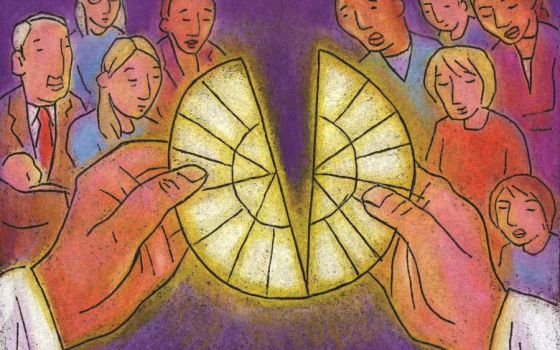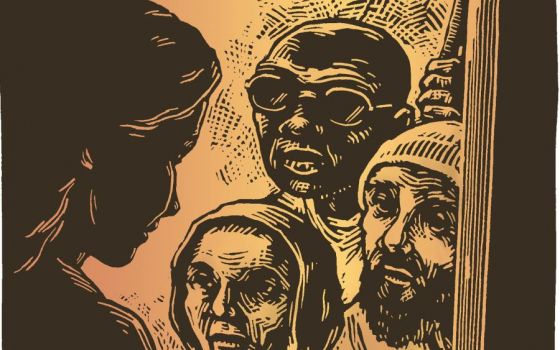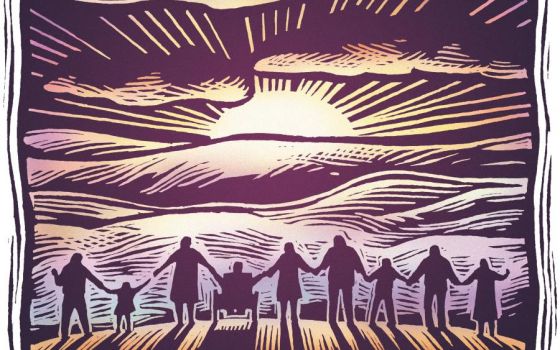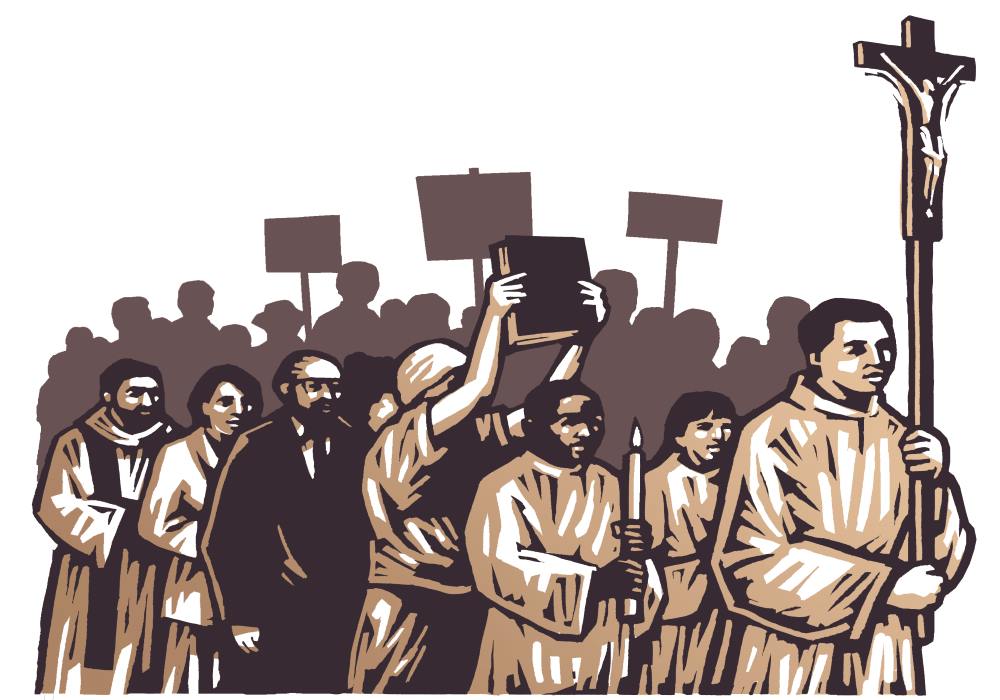
(Julie Lonneman)
Those educated in vintage Catholic schools, like myself, were often supplied with seemingly iron-clad proofs that our church was the "true" church. It certainly worked. Every morning for over eight years, I walked past Christ Evangelical and Reformed Church on my way to St. Mary's School, but I was never even tempted to chuck my Catholicism and join that particular Protestant community. Though my relatives who were members of Christ Church seemed content with their choice, down deep I was convinced that somewhere along the line they had made the wrong decision. My only hope was that eventually they would think it over and convert to the religion Jesus actually founded.
Back then, one of the reasons I believed we were the true church and they weren't revolved around our claim that "We've never changed." For 2,000 years, we had faithfully maintained the faith that Jesus of Nazareth proclaimed during his earthly ministry. During that same time, these other churches accepted various human additions and subtractions that altered Jesus' original message. Most, for instance, rejected the papacy Jesus had personally set up, and some even changed their position on artificial birth control. Such basic alterations were clear signs that Protestants were dealing with a human, not a divine, institution. In my mind, they reasoned that if Jesus' faith ever became too hard to maintain, they would just take a vote and change it.
We Catholics, on the other hand, never did that. If you had walked into one of our churches or picked up one of our catechisms, what you would see or hear is exactly what Jesus gave us. From Easter Sunday to today, we never changed one iota of the faith he personally entrusted to us.
But if that is still the mentality of our church, we had best not read this month's Scriptures. Wonder of wonders, they present us with a constantly changing Christian community. Flying in the face of my grade school religion classes, some of these particular Christian sacred authors dare to go even further, depicting those who refuse to alter their beliefs as enemies of the true faith! Chester A. Riley (of the 1940s radio comedy series) classically nailed the situation: "What a revoltin' development this is!"
Actually, the "development" revolved around how we saw Jesus of Nazareth. Though I believed Jesus had risen from the dead, the Jesus that I and the Catholics around me followed was the "historical Jesus": a free Palestinian-Jewish man who lived between 6 B.C.E and 30 C.E. None of our sacred authors experienced that individual. The only Jesus they encountered was the "risen Jesus" — a unique person who came into existence on Easter Sunday — someone who (as Paul once reminded the Galatians) was neither Jew nor Gentile, slave nor free, male nor female.
This is the Jesus whom Peter and the apostles preach as they stand before the Sanhedrin as we hear in the first reading on the Third Sunday of Easter. They not only "witness" that this itinerant preacher lives, but lives as the new creation the historical Jesus has morphed into — the "Lamb" which the author of Revelation has also encountered. It is to the risen Jesus that all creation is expected one day to say, "Amen!" — to his/her presence in their lives. Only then, can the community honestly join in the psalmist's conviction that God has truly "rescued me."
Considering the significance of the risen Jesus in the life of the biblical church, today's Gospel pericope can't be overestimated. Though it's part of an added chapter attached to the end of the last Gospel, the pericope appears to narrate one of the community's earliest encounters with the risen Jesus. Most Scripture scholars believe this is how Jesus' first followers initially experienced him after his death and resurrection. The person they encounter isn't just a resuscitated human being, that person is now a new creation.
For the time being, forget about angels at the tomb and the Emmaus and upper room apparitions. Those biblical events appear to be more theological than historical. In "real time," only when Jesus' disappointed and depressed disciples stop moping around, and, as the late Elizabeth Kübler Ross pointed out, eventually "go back to work," do they discover Jesus' new persona. The person they experience at that point in their everyday lives isn't the same person they knew before Easter Sunday. Not only isn't that person easily recognizable, but as Peter quickly learns, once the recognition happens, there is work to do.
The historical Jesus isn't the only one who changes. Those who experience the risen Jesus also morph into new creations. They are no longer the same people they were before the Christ's resurrection. An individual, for instance, who three times denied even knowing Jesus of Nazareth, now preaches about their relationship before the Jewish Sanhedrin. Peter has truly been transformed into the flock's feeder, imitating the Shepherd we meet in the Gospel of the Fourth Sunday of Easter.
One of the major questions the early church eventually was forced to face revolved around the makeup of that flock. How long would it comprise only Jews? Luke answers that in today's first reading, when Paul "turns to the Gentiles." In a drastic change, anyone can now become another Christ. He or she no longer needs to be Jewish in order to be Christian. The "great multitude" that the author of Revelation envisions now actually comprises individuals "from every nation, race, people and tongue." It is no longer limited to just one people and religion. Though the psalmist probably referred poetically to "all you lands," late-first century followers of the risen Jesus take those words (and those people) literally. No one could have anticipated such a drastic change of direction during Jesus' earthly ministry. During that time, he simply was a Jew preaching to other Jews.
On the Fifth Sunday of Easter, John provides us with the basic reason behind this transformation. At no point, does his Jesus provide us with a blueprint for the makeup of the Christian community, nor lay out the dogmas to which its members must adhere. They are expected to follow just one directive: "As I have loved you, so you also should love one another. This is how all will know that you are my disciples, if you have love for one another." They need no further explanation for changing their behavior. As loving people, they know there is no one action that always, to all people, shows love. Lovers either change, or the love disappears.
Luke tells us Paul's community in Antioch agrees. They are the "church" that originally commissioned Paul and Barnabas to do something Jews rarely do: Evangelize. But the pair reached far beyond expectations; they eventually proclaimed the good news to more people than their fellow Jews. Yet this unexpected outreach wasn't prompted by human motives. It was God, who, by means of the risen Jesus, "has opened the door of faith to the Gentiles." A resuscitated Jesus could never have pulled this off. Remaining a free, male Jew, he would have been limited by his social status, race and gender. Only a new creation could have looked at this situation with new eyes.
Advertisement
Of course, to fulfill the psalmist's vision of a God who is "good to all," the community had first to recognize the good in all — not just in Jews. Followers of the risen Jesus were constantly expected to experience Revelation's "new heaven and a new earth." The world around them was new because they were new. The Christ they have become is the risen Christ, not the free, male, Jewish preacher who had originally turned them on to his faith.
It is clear from the Acts reading for the Sixth Sunday of Easter that my generation wasn't alone in eschewing changes in the church. Luke tells us, "Some who had come down from Judea were instructing the brothers and sisters, ‘Unless you are circumcised according to the Mosaic practice, you cannot be saved.' " In other words, "We've got to return to the day when followers of Jesus must become Jews before they can become Christians."
Scholars frequently refer to these biblical traditionalists as "Judaizers." Paul deals with them in his letters, especially Galatians, and they seem to be a constant thorn in the side of first and second century Christians. (Some historians — like Garry Wills — contend that Judaizers actually turned Paul and Peter over to the Roman authorities, resulting in their martyrdoms!) These old-time religionists felt called to rid the church of these "liberals" at any cost. I trust we Catholics never fell into that trap. (Can you spell "Inquisition?")
But if constant change is essential to faith, how do we know what the risen Jesus is telling us to change? Can it just be our selfish personality rising to the fore? Or is there a divine force actually communicating with us? Listening to today's Gospel pericope, John clearly is convinced of the latter. He believes the Holy Spirit is at work in those situations. During the last meal that Jesus shares with his followers, he announces, "The Advocate, the Holy Spirit, whom the Father will send in my name, will teach you everything and remind you of all that I told you." If there's any doubt the early church believed the Advocate was going to shake things up on a regular basis, John's Jesus removes that doubt in 16:12. "I have much more to tell you," he promises, "but you cannot bear it now. But when he comes, the Spirit of truth, he will guide you to all truth." Obviously, Gospel faith is an ongoing process. As John XXIII famously observed before the start of the Second Vatican Council, "We are not on earth to guard a museum, but to cultivate a flowering garden of life."
Yet the author of Revelation is convinced that getting rid of our museum mentality is costly. The security, for instance, which the ancient Jerusalem Temple offered the people of God could only be replaced with the security of the "Lamb" at work in the life of our faith communities. We have no choice but to fall back on the risen Jesus' Spirit in our midst; to believe, as the psalmist put it, that the face of God is constantly shining upon us.
Both Luke in Acts and John in his Gospel believe the community always is to play an essential role in changes that affect the community. With that in mind, it's no accident that Pope John's words about being a flourishing garden were uttered in the context of an ecumenical council.
The late Carrol Stuhlmueller stated that he was certain the Spirit was communicating with him when such an encounter actually cost him something. Certainly, the change from a Jewish church to a Gentile church deeply cost the Jewish church. As we heard, for instance, in the Revelations passage, their equalizing love of non-Jews demanded they give up prerogatives in which only they could boast.
With that in mind, I fear our church's insistence (and pride) on not-changing has less to do with being the true church than with our determination to avoid suffering. It is simply far easier and requires far less involvement with others to imitate a resuscitated Jesus than a risen Jesus.
Editor's note: This reflection was originally published in the May 2019 issue of Celebration. Sign up to receive daily Easter reflections.





